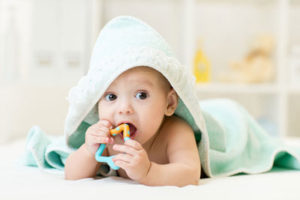Facts parents should know about baby’s first tooth

Human development science has grown tremendously and the research has gone far ahead in determining what is good or bad in childrearing practices. Due to the massive research in upbringing of children, and how to optimize the conditions for the optimum physical growth for babies, the experts in the field have put together tips for each area of growth including teeth.
Teething is one of the important milestones in the growth and development of children. Even in this day and time, superstitions prevail about teething among other things. The prevailing myth about teething is fever and diarrhoea when teeth erupt for the first time.
Baby’s first tooth
What should we as parents know about your baby’s first tooth?
- One thing you should remember always is that all the children develop at a different rate. The rate of growth for individual baby differs a lot. Therefore, no two babies will have their first tooth at the same time even if their age is same. But we can say that most babies have their first tooth erupt between 6 and 12 months. Again, there may be some babies with first tooth appearing at 4 months, and there are babies who celebrate their first birthday without any teeth!
- Usually the first tooth is always lower front teeth. But like everything else there may be a few babies who grow other than the front lower teeth.
- When your baby is teething, a lot of saliva is produced. It is normal. Not to worry. Babies have the habit of putting things in mouth very early may be as soon as they can grip things in their hands or mouths. This does not mean that they are teething. Putting things in mouth are their way of exploring the world. Even after teething, they may continue to put things in their mouth. It is important to keep things around babies, clean and safe.
- Fluoride is an important element which helps in hardening of enamel in teeth. In developed countries, fluoride is added in tap water. Find out if your tap water contains fluoride. You can ask your paediatrician if your baby needs a fluoride supplement, after you have introduced semi solid and solid foods to your baby’s diet may be around 6 months. Since the baby is in exploration mode, and puts everything in his mouth, use a little fluoride toothpaste and rub it on his tooth with a soft toothbrush. Fluoride is needed to protect his tooth from decay.
- Usually teething does not cause pain, but some babies may feel discomfort while teething. It would help to massage the sore gums of the baby, or give acetaminophen occasionally. The gums around the tooth which is erupting may get swollen sometime, or may become tender. Some babies drool a lot of saliva while teething. Clean your fingers and slowly massage the gums which relieve discomfort. Solid filled teething ring may also help. Solid filled teething rings also help when the teething baby wants to chew on something to relieve the itch or discomfort. Teething biscuits hold a hazard for they may break off and the baby may get choked on a chunk of biscuit.
- It is advised to introduce the child with brushing the teeth as soon as the first tooth erupts. It is true that the teething child may have sore or tender teeth, but brushing the tooth from day one is a good start. Fluoride toothpaste as much as a grain of rice should be put on a baby toothbrush or on your finger and bushed on the gum and the tooth. Brush for a few seconds. You can guide your child’s finger over the tooth as a brush.
- If your baby is on bottle feed, remember to take it out before the baby goes to sleep. Milk on the teeth may lead to decay. Many times the baby goes to sleep with the bottle and a little milk keep seeping out and may remain in the mouth leading to decay in the tooth.
- The first dental visit to your dentist for the baby should be planned after the first tooth has erupted. The dentist will make friends with your baby and subsequent visits will be easier if the first visit is happy. The dentist will play a vital role in baby’s dental life and it the first visit will give the baby a head start in case any problems are encountered in teeth eruption later on.
- While teething a baby may have slightly higher temperature and a little discomfort. But very high fever has nothing to do with teething. It may have other reasons and the parent should talk it over with baby’s paediatrician. It could be an infection that needs attention.
- Some parents overlook the importance of milk teeth because they will eventually fall off and new permanent teeth will erupt in their place. This is a fallacy. When the baby has healthy teeth he will be saved from tooth decay and painful treatment.
